Neutering is a procedure that either partially or totally removes a dog’s reproductive organs. Neutering can refer to both males and females, however it is also referred to as castration for males and spaying for females. Neutering is done to prevent unplanned pregnancies, reduce aggressiveness, and boost the animal’s lifespan and overall health.
Neutering provides numerous advantages for dogs and their owners, including lower chance of certain cancers, infections, and diseases, prevention of undesired behaviors such as roaming, fighting, or mating, and improvement of the dog’s disposition and quality of life. However, some dogs may have issues after being neutered, such as having accidents around the house.
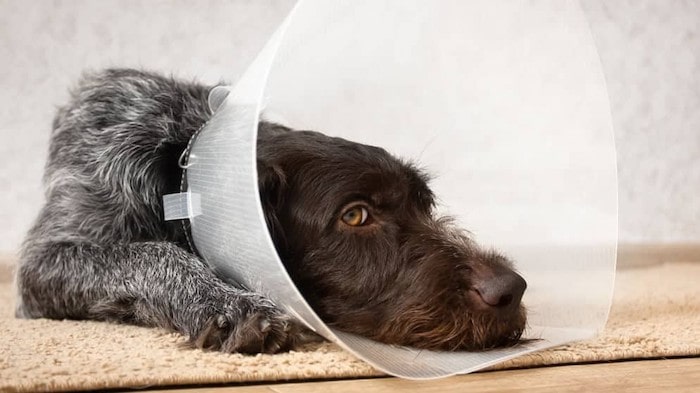
Accidents are one of the most common problems that owners face after neutering their dogs. Accidents can occur for various reasons, ranging from physical to psychological, and can cause frustration, stress, and embarrassment for both the dog and the owner. Fortunately, accidents are usually temporary and manageable, and can be prevented or resolved with proper understanding and care.
In this article, we’ll explore the possible reasons why your dog is having accidents after being neutered, and what you can do about it. We’ll also provide tips and strategies for preventing and managing accidents, and suggest ways to ensure a smooth recovery for your furry friend. By understanding the underlying factors and implementing appropriate measures, you can help your dog get back on track with their potty habits.
Table of Contents
Possible Reasons for Accidents after Being Neutered
Accidents can occur in neutered dogs due to various factors, such as:
Urinary incontinence
Urinary incontinence is a condition where a dog loses control over its bladder and may leak urine involuntarily. It can occur in neutered dogs due to a weakening of the muscles that control the bladder, leading to leakage or full-blown accidents.
Urinary incontinence can be caused by hormonal changes that occur after neutering. In male dogs, neutering reduces the production of testosterone, which helps maintain bladder tone and function. In female dogs, spaying removes the ovaries and uterus, which produce estrogen, which also helps regulate bladder control.
Urinary incontinence can also be caused by age-related degeneration of the bladder muscles or nerves, or by other medical conditions such as diabetes, kidney disease, or urinary tract infection (UTI).
Urinary incontinence can affect dogs of any age, breed, or gender, but it is more common in older dogs and female dogs who have been spayed. It can also vary in severity and frequency, depending on the dog’s individual situation.
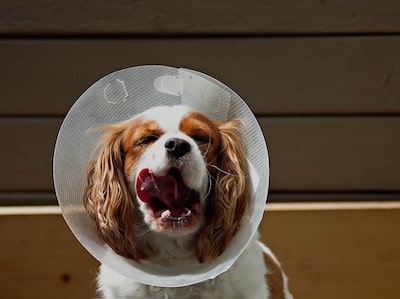
Marking behavior
Marking behavior is when a dog urinates in specific areas of the home or yard to leave their scent. Marking behavior is usually done by male dogs who are intact (not neutered), as a way of asserting their dominance or territoriality over other dogs or animals.
However, some dogs may develop a new marking behavior after being neutered, due to various reasons. For example:
- Some dogs may mark more frequently after being neutered to compensate for the loss of their sex hormones or reproductive organs.
- Some dogs may mark out of confusion or insecurity after being neutered, as they adjust to their new physical and emotional state.
- Some dogs may mark out of boredom or frustration after being neutered, as they have less energy or motivation to engage in other activities.
- Some dogs may mark out of habit or preference after being neutered, as they have learned to associate certain places with urination.
Marking behavior can result in accidents if the dog is unable to hold their bladder or if the behavior becomes excessive. Marking behavior can also be triggered by environmental factors such as new pets or people in the home, changes in furniture or layout, or unfamiliar smells or sounds.
Postoperative complications
Although rare, complications after a neutering procedure can occur, such as bladder or urethral trauma. These complications can lead to pain and difficulty urinating, which may result in accidents.
Bladder or urethral trauma can occur during surgery due to accidental injury to the urinary organs or structures. This can cause bleeding, inflammation, infection, or obstruction of the urinary tract. Bladder or urethral trauma can also occur after surgery due to improper care or handling of the surgical site.
Bladder or urethral trauma can affect dogs of any age, breed, or gender who have undergone neutering surgery. It can also vary in severity and duration depending on the extent of the damage and the treatment received.
Anxiety or stress
The neutering procedure itself can be a stressful experience for a dog, leading to anxiety or stress that may manifest as accidents. Additionally, any changes in the home environment such as a new pet or family member, can also trigger anxiety and accidents.
Anxiety or stress can cause a dog to have accidents due to various reasons. For example:
- Anxiety or stress can affect the dog’s nervous system, which can interfere with their bladder control and function.
- Anxiety or stress can increase the dog’s thirst and water intake, which can overfill their bladder and cause leakage or accidents.
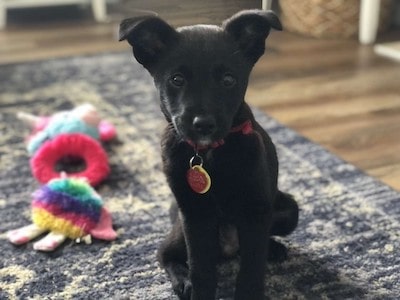
- Anxiety or stress can make the dog more sensitive or fearful of stimuli such as noises or movements, which can startle them and cause them to urinate involuntarily.
- Anxiety or stress can make the dog more clingy or needy, which can make them reluctant to leave their owner’s side or go outside to eliminate.
Anxiety or stress can affect dogs of any age, breed, or gender who have undergone neutering surgery. It can also vary in intensity and duration depending on the dog’s personality, temperament, and coping skills.
Lack of training or reinforcement
Sometimes accidents can occur simply because the dog hasn’t been properly trained or reinforced to eliminate in specific areas. This can be exacerbated by the physical changes in the dog’s body after neutering, making it more challenging for them to hold their bladder or communicate their need to go out.
Lack of training or reinforcement can be caused by various factors, such as:
- The dog was not fully potty trained before being neutered, or the training was inconsistent or incomplete.
- The dog was not given enough opportunities or access to go outside to eliminate, or the schedule was irregular or unpredictable.
- The dog was not praised or rewarded for eliminating in the right place, or was punished or scolded for eliminating in the wrong place.
- The dog was confused or distracted by changes in the environment, such as new smells, sights, or sounds.
Lack of training or reinforcement can affect dogs of any age, breed, or gender who have been neutered. It can also vary in frequency and severity depending on the dog’s learning ability and motivation.
Signs of Accidents after Being Neutered
Accidents can be easy or hard to spot depending on the situation. Some signs that indicate that a dog is having accidents are:

- Wet spots on the floor, furniture, or bedding
- Urine odor or stains around the house
- Frequent licking of the genital area
- Straining or discomfort when urinating
- Changes in appetite, thirst, or behavior
If you notice any of these signs in your dog after being neutered, you should consult your vet to rule out any medical issues and get advice on how to manage the problem.
Solutions for Post-neutering Accidents in Dogs
Accidents are usually temporary and manageable, and can be prevented or resolved with proper understanding and care. Here are some tips and strategies for preventing and managing accidents in neutered dogs:
Adjust your dog’s diet and hydration
Urinary incontinence, a condition where a dog loses control of its bladder and may leak urine involuntarily, can be managed by adjusting your dog’s diet and hydration. For example:
- Feed your dog a high-quality diet that is appropriate for their age, size, and activity level. Avoid foods that are high in salt, fat, or additives that may irritate the bladder or increase urine production.
- Provide your dog with fresh water at all times, but limit their intake before bedtime or when you are away from home. Avoid giving your dog caffeinated drinks such as coffee, tea, or soda that may stimulate the bladder or cause dehydration.
- Consult your vet about supplements or medications that may help strengthen your dog’s bladder muscles or reduce leakage. Some examples are cranberry extract, corn silk extract, estrogen replacement therapy (for female dogs), phenylpropanolamine (PPA), diethylstilbestrol (DES), etc.
Establish a regular bathroom routine and reward good behavior
Marking behavior, where a dog urinates in specific areas of the home or yard to leave their scent, can be prevented or corrected by establishing a regular bathroom routine and rewarding good behavior. For example:
- Take your dog outside to eliminate at least four times a day, especially after waking up, before going to bed, and after meals or playtime. Choose a designated spot for your dog to urinate and stick to it. Avoid areas that have been marked by other dogs or animals.
- Praise your dog verbally and give them a treat every time they urinate in the right place. Ignore any accidents that happen inside the house and clean them up thoroughly with an enzymatic cleaner to remove any traces of urine odor.
- Neuter your dog as early as possible (preferably before six months of age) to reduce their urge to mark their territory. If your dog is already neutered but still marks inside the house, consult your vet about behavioral modification techniques or medications that may help curb this habit.
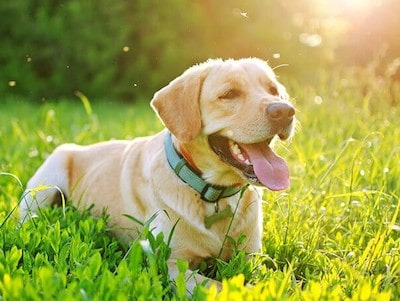
Monitor your dog’s health and recovery
Postoperative complications such as bladder or urethral trauma, infection, or inflammation can be avoided or treated by monitoring your dog’s health and recovery. For example:
- Follow your vet’s instructions and advice on how to care for your dog after the surgery. This may include giving your dog painkillers, antibiotics, or anti-inflammatory drugs, keeping the surgical site clean and dry, preventing your dog from licking or biting the stitches, and restricting your dog’s activity and movement.
- Check your dog’s urine for any signs of blood, pus, or crystals that may indicate a problem. If you notice any abnormal color, smell, or consistency in your dog’s urine, contact your vet immediately.
- Watch out for any signs of pain, discomfort, or difficulty urinating in your dog, such as whimpering, panting, shaking, straining, or dribbling. If you notice any of these signs, take your dog to the vet as soon as possible.
Provide comfort and reassurance to reduce anxiety or stress
Anxiety or stress can cause a dog to have accidents due to various reasons. To reduce anxiety or stress in your dog after being neutered, you can provide comfort and reassurance. For example:
- Spend quality time with your dog and give them plenty of attention and affection. Play with them, cuddle with them, talk to them, and make them feel loved and secure.
- Provide your dog with a safe and comfortable place to rest and relax. Give them a cozy bed, blanket, or toy that they can snuggle with. Avoid exposing them to loud noises, bright lights, or unfamiliar people or animals that may scare them.
- Use calming aids such as pheromone diffusers, sprays, or collars that can help soothe your dog’s nerves and reduce their anxiety. You can also try natural remedies such as lavender oil, chamomile tea, or CBD oil that may have a calming effect on your dog.
Reinforce potty training and correct marking behavior
Lack of training or reinforcement can cause a dog to have accidents simply because they don’t know where or when to eliminate. To prevent or correct this problem, you can reinforce potty training and correct marking behavior. For example:
- Review the basics of potty training with your dog and make sure they understand the rules and expectations. Use clear and consistent commands such as “go potty” or “outside” to signal when it’s time to eliminate. Avoid confusing your dog by changing the location or schedule of their bathroom breaks.
- Correct any marking behavior that you witness in your dog by interrupting them with a firm “no” or a loud clap and taking them outside to finish their business. Do not punish your dog physically or verbally for marking inside the house, as this may make them more anxious or fearful and worsen the problem.
- Reward your dog for eliminating in the right place and not marking inside the house. Give them praise, treats, toys, or playtime every time they do it right. Make sure they associate urinating outside with positive outcomes and urinating inside with negative outcomes.
Prevention of Post-neutering Accidents in Dogs
Accidents can be prevented from happening in the first place by taking some precautions before and after neutering your dog. Here are some ways to prevent accidents in neutered dogs:
Choose the right time and age for neutering your dog
Neutering your dog at the right time and age can reduce the risk of accidents after the surgery. The optimal time and age for neutering depends on various factors such as your dog’s breed, size, health, and lifestyle.
Generally speaking, most vets recommend neutering dogs between six months and one year of age, before they reach sexual maturity and develop hormonal behaviors such as marking or roaming. However, some vets may advise waiting until the dog is fully grown or matured, especially for large breeds that may have slower growth rates or higher risks of joint problems.
Consult your vet about the best time and age for neutering your dog based on their individual situation.
Prepare your dog for the surgery and the recovery period
Preparing your dog for the surgery and the recovery period can help them cope better with the procedure and avoid any complications that may lead to accidents. To prepare your dog for the surgery and the recovery period, you can do the following:
- Schedule a preoperative checkup with your vet to make sure your dog is healthy enough for the surgery. Your vet may perform some tests such as blood work, urine analysis, or x-rays to assess your dog’s condition and identify any potential issues.
- Follow your vet’s instructions on how to prepare your dog for the surgery day. This may include fasting your dog for 12 hours before the surgery, withholding water for two hours before the surgery, and bringing any medications or supplements that your dog is taking.
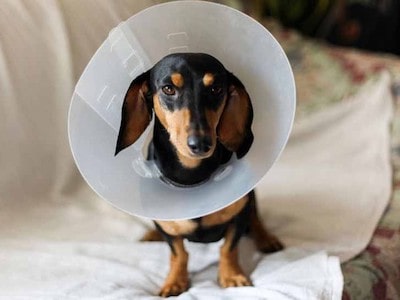
- Arrange a safe and comfortable transportation for your dog to and from the clinic. Use a crate, carrier, or leash to secure your dog in the car and prevent them from moving around or injuring themselves. Avoid any sudden stops, turns, or bumps that may cause discomfort or stress to your dog.
- Set up a cozy and quiet recovery area for your dog at home. Choose a room that is away from any noise, distractions, or other pets that may bother your dog. Provide your dog with a soft bed, blanket, or toy that they can rest on. Keep the room temperature moderate and the lighting dim.
Follow your vet’s instructions and advice
Following your vet’s instructions and advice can help your dog heal faster and prevent any postoperative complications that may cause accidents. Your vet may give you some instructions and advice such as:
- Give your dog the prescribed medications or supplements as directed by your vet. This may include painkillers, antibiotics, or anti-inflammatory drugs that can help your dog recover and prevent any infections or inflammations.
- Check your dog’s surgical site regularly for any signs of bleeding, swelling, redness, or discharge that may indicate a problem. If you notice any of these signs, contact your vet immediately.
- Prevent your dog from licking or biting the stitches or the surgical site, as this can cause irritation, infection, or reopening of the wound. Use an Elizabethan collar (also known as a cone or e-collar) or a bandage to cover the area and discourage your dog from touching it.
- Restrict your dog’s activity and movement for at least 10 days after the surgery, or as advised by your vet. Avoid any strenuous exercise, jumping, running, or playing that may put pressure on the surgical site or cause bleeding or pain. Limit your dog’s walks to short and gentle ones, and use a leash to control their pace and direction.
FAQ
Is it normal for dogs to have accidents after being neutered?
While it’s not uncommon for dogs to have accidents after being neutered, it is generally not considered normal behavior. Neutering itself should not directly cause accidents. However, factors such as anesthesia, pain medication, or changes in routine during the recovery period can contribute to accidents. If the accidents persist or become a frequent occurrence, it’s best to consult with your vet for further evaluation.
How long can accidents last after dog neutering?
The duration of accidents after dog neutering can vary from dog to dog. In most cases, accidents should gradually decrease within a week or two as the dog’s body adjusts and the recovery progresses. However, individual factors such as the dog’s age, temperament, and overall health can influence the timeline. If accidents persist beyond a couple of weeks or if they worsen, it’s advisable to seek veterinary advice.
When should I be concerned about my dog’s accidents after neutering?
If your dog’s accidents continue for an extended period, worsen over time, or are accompanied by other concerning symptoms such as excessive thirst, lethargy, or pain, it is important to consult with your veterinarian promptly. These could be indicators of an underlying issue such as a urinary tract infection, surgical complication, or other health concerns that require professional attention.
Can the anesthesia used during neutering cause accidents in dogs?
Anesthesia itself does not directly cause accidents in dogs. However, the effects of anesthesia can temporarily impair muscle control and coordination, which may contribute to accidents immediately following the surgery. As the anesthesia wears off and the dog recovers, the accidents should diminish. If accidents persist beyond the initial recovery period, it’s advisable to consult with your veterinarian.
Conclusion
Neutering is a beneficial procedure that can improve your dog’s health and behavior. However, some dogs may have accidents after being neutered due to various reasons such as urinary incontinence, marking behavior, postoperative complications, anxiety or stress, or lack of training or reinforcement.
Accidents are usually temporary and manageable, and can be prevented or resolved with proper understanding and care. By following the tips and strategies we’ve provided in this article, you can help your dog get back on track with their potty habits and enjoy a smooth recovery.
If you have any questions or concerns about your dog’s accidents after being neutered, don’t hesitate to contact your vet for professional help. Your vet can diagnose any medical issues and provide appropriate treatment and advice for your dog’s situation.


